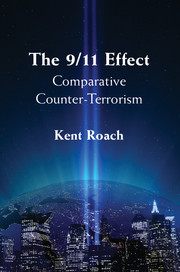Book contents
- Frontmatter
- Brief Contents
- Contents
- Acknowledgments
- 1 Introduction
- 2 The United Nations Responds: Security Council Listing and Legislation
- 3 Countries That Did Not Immediately Respond
- 4 The United States Responds: Executive Power and Extra-Legalism
- 5 The United Kingdom Responds: A Legislative War on Terrorism
- 6 Australia Responds: Hyper-Legislation
- 7 Canada Responds: Border and Human Security
- 8 Conclusions
- Index
- References
4 - The United States Responds: Executive Power and Extra-Legalism
Published online by Cambridge University Press: 05 June 2012
- Frontmatter
- Brief Contents
- Contents
- Acknowledgments
- 1 Introduction
- 2 The United Nations Responds: Security Council Listing and Legislation
- 3 Countries That Did Not Immediately Respond
- 4 The United States Responds: Executive Power and Extra-Legalism
- 5 The United Kingdom Responds: A Legislative War on Terrorism
- 6 Australia Responds: Hyper-Legislation
- 7 Canada Responds: Border and Human Security
- 8 Conclusions
- Index
- References
Summary
INTRODUCTION
The American response to 9/11 has been much criticized around the world but not always carefully understood in the context of the United States’ unique legal and political culture. The American approach, especially in the three years after 9/11, was dominated by an aggressive assertion of executive power and by conduct that was supported by dubious claims of legality. The most infamous conduct was directed at non–American citizens outside the United States. It included detentions without trial at Guantánamo Bay and elsewhere, torture and abuse at Abu Ghraib and elsewhere, and increased use of extraordinary renditions to countries with poor human rights records. Some of the extralegal activity, such as the Presidential designation and military detention of Yaser Hamdi and Jose Padilla as enemy combatants and the illegal domestic spying of the National Security Agency (NSA), was directed at American citizens.
- Type
- Chapter
- Information
- The 9/11 EffectComparative Counter-Terrorism, pp. 161 - 237Publisher: Cambridge University PressPrint publication year: 2011



